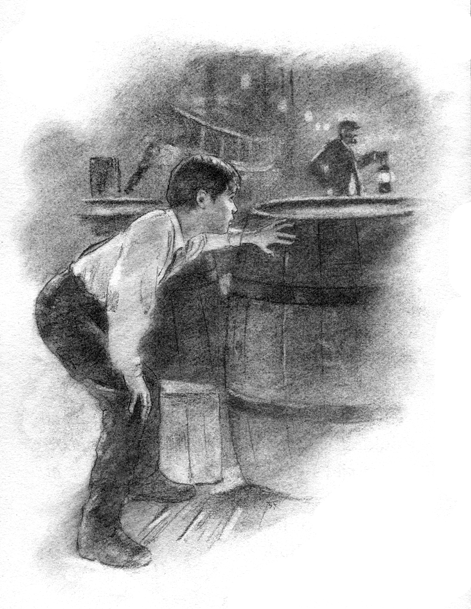 Midnight on the Dock
Midnight on the Dock 
 Midnight on the Dock
Midnight on the Dock 
“Don’t dawdle, boy. Clear the gentlemen’s dishes!” ordered Mrs. Tinker when supper was over.
I thought she’d never stop giving me chores to do. But finally I managed to escape to my room.
All I wanted to do was sleep, but I didn’t dare lie down for even a minute. What if I didn’t wake up in time?
Instead I got ready. I pulled out my old rucksack from under my cot. I stuffed my winter jacket inside, along with extra socks, underwear, pants, and shirts. I took Momma’s wooden box, with her letters and the only photograph I had of her. There was enough room for my wool blanket. I slipped the whistle Tag had given me into my pocket.
I couldn’t go without my pencils and sketchbook. As I went to put them in a sheet of paper slipped to the floor. It was a sketch of Cook I’d done one rainy morning as she was kneading bread. It wasn’t very good, but at least I’d been able to capture the twinkle in her eye.
What would Cook think when she found out I was gone? I knew she’d be worried. But I still didn’t dare tell her the truth. After all, she was a grown-up, and she might feel obliged to tell Mrs. Tinker.
All at once I had an idea. Grabbing my pencil, I wrote on the bottom of the sketch: Mabel Cole, Best Cook in Seattle, drawn by David Hill, age 11, 1897.
I didn’t own a watch, but that didn’t matter: Mrs. Tinker went to bed every night at ten o’clock sharp. As she said good night to the boarders, her shrill voice carried through the house, even to the attic. I opened my door and stood on the landing to listen.
“Good night, gentlemen. And good luck to you, Mr. Larsen,” she said.
“Don’t forget me, Mrs. Tinker,” said a deep voice. “I’m headed to Skagway on the Al-ki too.”
I froze, barely able to breathe. Big Al! He would be on the very same boat. But I wasn’t about to back out now.
I waited until the house was dark and still. Holding my shoes in one hand and my pack in the other, I tiptoed down the stairs in my stocking feet.
First I stopped in the kitchen. I knew Cook wouldn’t mind if I took some leftover biscuits and dried apples. Then I made my way to the back of the house.
The sounds of gentle snoring came from Cook’s room. “Good-bye, Cook,” I whispered. “I hope I see you again.”
Then I slipped the sketch under her door and was gone.
On the dock I crouched out of sight behind a wooden post. The minutes dragged. What if Tag forgot?
All at once he was beside me. “You ready, kid?” he whispered, grinning.
I nodded. My teeth were chattering, but not from cold.
“What now?” I whispered back.
“Some of the freight has already been loaded. When you get on board, find a place below to hide,” Tag told me.
He pointed to the old freighter, bobbing gently at the dock. “I’m pretty sure there’s just this one old guy on guard. I’ll go over there and distract him. When he leaves his post, make a run for it”
I gulped. “But… but how do I know he’ll leave?”
“Don’t worry, he will. You can do it, kid.” Tag clapped his hand on my shoulder. “When the time is right, creep up, hiding behind whatever you can. Then make your move.”
Without another word Tag slunk off, moving like a cat. I crept forward, hiding behind a few barrels and crates. I was close enough to see the guard, a thin man with a white mustache that shone in the glow of his lantern.
I held my breath and listened as hard as I could. All I could hear was the lapping of the water against the dock.
I put my hand over my heart, but it wouldn’t stop pounding. What if the guard catches me? I thought. What if I can’t hide in time?
All at once the silence was broken by a crash, then a thud.

“Help! Oh, please help me!” Tag’s yell came sharply across the dock.
The guard jerked to attention. “Who’s there?”
“Over here! Over here! Ouch, it hurts. My ankle!”
For a second I smiled, imagining Tag writhing on the ground, pretending to be hurt. The guard must have been a kindhearted man. He took off in a run to where Tag lay buried under crates and boxes.
Now! I told myself. Run, now!